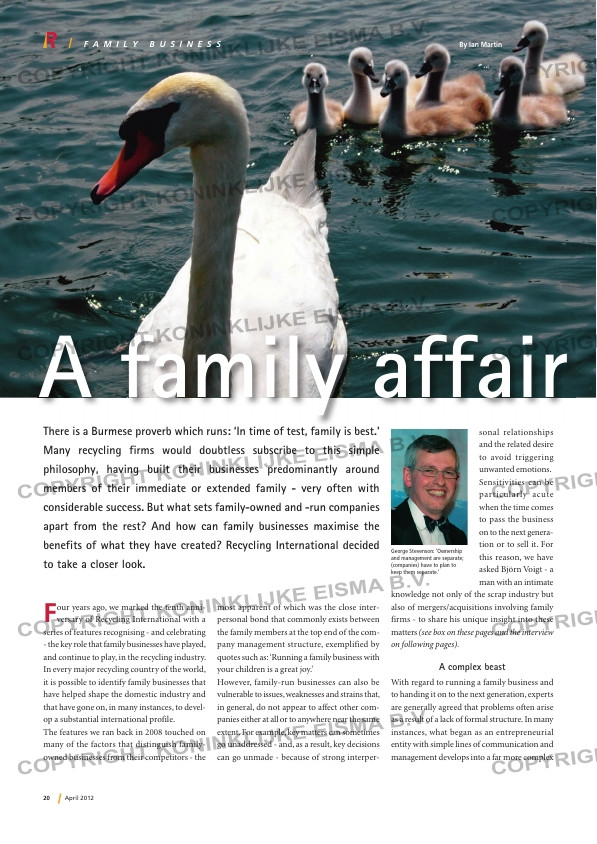Page 20 from: April 2012

20 April 2012
There is a Burmese proverb which runs: ‘In time of test, family is best.’
Many recycling firms would doubtless subscribe to this simple
philosophy, having built their businesses predominantly around
members of their immediate or extended family – very often with
considerable success. But what sets family-owned and -run companies
apart from the rest? And how can family businesses maximise the
benefits of what they have created? Recycling International decided
to take a closer look.
Four years ago, we marked the tenth anni-versary of Recycling International with a
series of features recognising – and celebrating
– the key role that family businesses have played,
and continue to play, in the recycling industry.
In every major recycling country of the world,
it is possible to identify family businesses that
have helped shape the domestic industry and
that have gone on, in many instances, to devel-
op a substantial international profile.
The features we ran back in 2008 touched on
many of the factors that distinguish family-
owned businesses from their competitors – the
most apparent of which was the close inter-
personal bond that commonly exists between
the family members at the top end of the com-
pany management structure, exemplified by
quotes such as: ‘Running a family business with
your children is a great joy.’
However, family-run businesses can also be
vulnerable to issues, weaknesses and strains that,
in general, do not appear to affect other com-
panies either at all or to anywhere near the same
extent. For example, key matters can sometimes
go unaddressed – and, as a result, key decisions
can go unmade – because of strong interper-
F A M I L Y B U S I N E S S By Ian Martin
A family affair
sonal relationships
and the related desire
to avoid triggering
unwanted emotions.
Sensitivities can be
particularly acute
when the time comes
to pass the business
on to the next genera-
tion or to sell it. For
this reason, we have
asked Björn Voigt – a
man with an intimate
knowledge not only of the scrap industry but
also of mergers/acquisitions involving family
firms – to share his unique insight into these
matters (see box on these pages and the interview
on following pages).
A complex beast
With regard to running a family business and
to handing it on to the next generation, experts
are generally agreed that problems often arise
as a result of a lack of formal structure. In many
instances, what began as an entrepreneurial
entity with simple lines of communication and
management develops into a far more complex
George Stevenson: ‘Ownership
and management are separate;
(companies) have to plan to
keep them separate.’
20 am l s ss-1 20 30-03-12 16:2



